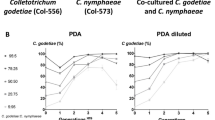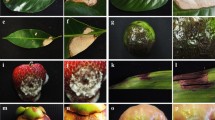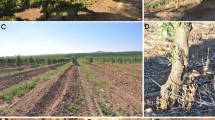Abstract
IN a study of the influence of soil moisture and pH on red core disease of strawberries, caused by Phytophthora fragariœ, Hickman, Hickman and English1 described an infection technique with plants in pots that gave consistent and rapid results, and the method was used for distinguishing physiological races2.
This is a preview of subscription content, access via your institution
Access options
Subscribe to this journal
Receive 51 print issues and online access
$199.00 per year
only $3.90 per issue
Buy this article
- Purchase on Springer Link
- Instant access to full article PDF
Prices may be subject to local taxes which are calculated during checkout
Similar content being viewed by others
References
Hickman, C. J., and English, Mary P., Trans. Brit. Mycol. Soc., 34, 223 (1951).
Hickman, C. J., and English, Mary P., Trans. Brit. Mycol. Soc., 34, 356 (1951).
Author information
Authors and Affiliations
Rights and permissions
About this article
Cite this article
HICKMAN, C., GOODE, P. A New Method of testing the Pathogenicity of Phytopfithora fragarlæ. Nature 172, 211–212 (1953). https://doi.org/10.1038/172211a0
Issue Date:
DOI: https://doi.org/10.1038/172211a0
Comments
By submitting a comment you agree to abide by our Terms and Community Guidelines. If you find something abusive or that does not comply with our terms or guidelines please flag it as inappropriate.



